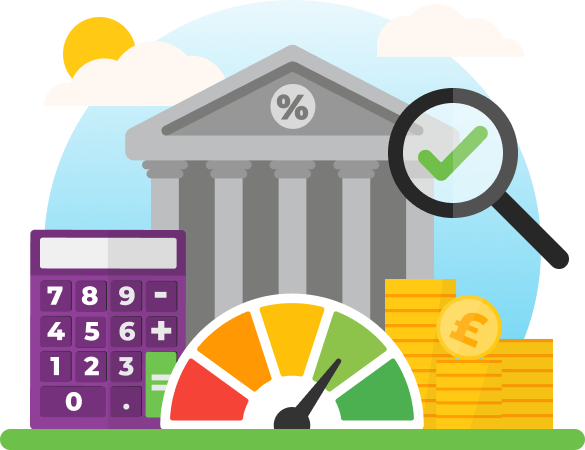There are many reasons why you might need to get a mortgage after the age of 50. You might be moving house, divorcing, or simply remortgaging. However, over 50s typically face stricter lending criteria and a shorter repayment period. This means that some mortgage deals may not be available, depending on your circumstances and the lender’s criteria.
In this guide, we will explain everything you need to know about getting a mortgage if you’re over 50, from the lending criteria to the types of mortgage.
Can You Get A Mortgage When You're Over 50?
Rather than set an age limit for when you take out a mortgage, most lenders have an age limit for when the mortgage must be repaid by. This is typically between 70 and 85.
This means that as you get older you might find it more difficult to take out a mortgage over 25 years. For example, if the lender’s age limit is 70 at the end of the term, you’ll need to be 45 or under to get a 25-year mortgage.
You might also find stricter lending criteria as you get older. If you will be retired during the mortgage term, lenders may ask for evidence that your mortgage payments would remain affordable based on your pension income.
Where Should I Start My Search?
Applying for a mortgage when you are over 50 might affect the deals that are available to you. Some people choose to use a mortgage broker to explore a wider range of deals, including those from smaller banks and building societies or specialist lenders.
If you’re moving house, you’ll also need a conveyancer to do the legal work. IT can be helpful to compare conveyancing quotes as prices and services vary between providers.

Compare Mortgage Brokers
Accredited mortgage brokers
Used by over 1.5 million movers in the UK
What Is The Lending Criteria For An Over 50s Mortgage?
As with all mortgages, the lender will run affordability checks to see if you can afford your mortgage payments.
Proving affordability might be more tricky if you plan to stop work during the mortgage term and will be relying on your pension or investment income to pay your mortgage. It’s often useful to have evidence of the following when approaching a lender or broker:
Source of Income
As with other types of mortgages, lenders will usually require evidence that you have enough money coming in to pay your mortgage. The lender will also check how reliable your source of income is. If you’re retired, lenders will ask for evidence of an ongoing income such as a pension or investment income.
A Good Credit Score
As always, the better your credit score the more mortgage deals you’ll have to choose from. Check out what credit score you need for a mortgage in our detailed guide.
How Many Years Mortgage Can You Get At 50?
Getting a mortgage if you are over 50 will typically mean you will have a shorter repayment period. Unlike the usual repayment period of 25 years, getting a mortgage at an older age will mean you’ll have less time to pay it off, depending on your age. Most lenders have an age limit of 70 to 85 for when you need to pay back your mortgage.
Lenders will look at how much of your mortgage will be paid back during your retirement years. If you are 10 years away from retiring with a 25-year term mortgage, lenders will base their affordability assessment on your retirement income. However, if you have a shorter mortgage repayment period then lenders will look at your current income.
If you're taking out a mortgage at 50, some lenders may still offer a typical repayment period of around 25 years, depending on your financial circumstances and their lending policies. Some lenders may have restrictions on lending beyond a certain age, often linked to their view of retirement income stability.
What Types Of Mortgages Are Available When Over 50?
Over 50s can apply for the same mortgages as other borrowers. These include:
Standard Mortgage
Standard Mortgages are available to those over 50 with the choice of a Fixed or Variable rate mortgages.
With a Fixed-rate Mortgage, the interest rate you pay per month is guaranteed to stay the same for a fixed amount of time, usually 2-5 years.
A Variable-Rate Mortgage will adjust each month depending on your lender’s standard variable rate. The lender can change this interest rate whenever it wants. This means you could be paying more some months, but less if the SVR is reduced.
Lifetime Mortgage
Another available mortgage option for over 50s is the Lifetime Mortgage. This can be taken out once you own your home outright. If you have paid off your current mortgage, a Lifetime Mortgage will allow you to release some equity in your house without selling it.
You must be over 55 and the loan you take out does not have to be paid back until you go into long-term care or pass away. Taking out a Lifetime Mortgage may reduce the amount of inheritance you’re able to leave, as the loan is repaid from the sale of your home.
Retirement Interest Only (RIO)
A Retirement Interest Only (RIO) Mortgage is one option available to people aged over 55 who are looking to remortgage to an interest-only deal. Remember, if you're remortgaging, you'll need the help of a remortgage conveyancer.
An RIO Mortgage works by borrowing a percentage of the value of your house as a cash lump sum. You’ll be charged only on the interest of the loan. The loan will be repaid once you have either sold your house, go into a care home, or passed away.
To apply for an RIO Mortgage, you must be over 55 and have a reliable and regular income that will prove you can pay back the monthly interest repayments only. Interest rates are often higher than traditional mortgages and can vary depending on the lender and your circumstances.

Compare Mortgage Brokers
Accredited mortgage brokers
Used by over 1.5 million movers in the UK
How Can You Increase Your Chances Of Getting A Mortgage Over 50?
Demonstrating a stable income and affordability may improve your chances of being accepted by some lenders. There are certain things that will also work in your favour:
You Have Equity in Your Home
If you’re remortgaging and have equity in your property, this will lower your loan-to-value (LTV). The lower the LTV, the more keen lenders will be to lend to you.
You Have Savings
If you have a decent amount of savings as well as a regular pension income or income from your job, you will stand a better chance of getting accepted for a mortgage. A lender will view your savings as a backup plan to repay your mortgage if anything happened with your income.


